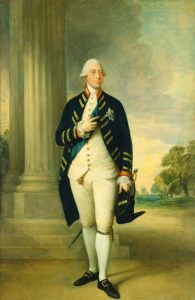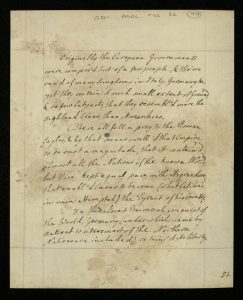About King’s College
King’s College is one of the top 25 ranked universities in the world and among the oldest in England. It has enjoyed the honour of Royal Patronage from its foundation in 1829 under George IV, to the present day, under Her Majesty Queen Elizabeth II. King’s College provides the academic lead for the Georgian Papers Programme (GPP), both from the perspective of interpretation, and in terms of providing guidance on the effective use of technology. King’s College is a multi-disciplinary institution with more than 27,600 students from some 150 countries worldwide, approximately 6,800 staff and a campus which extends over a number of sites across London.
In the 2014 Research Excellence Framework, King’s College was ranked sixth nationally in the ‘power’ ranking, which takes into account both the quality and quantity of research activity. Approximately 84 per cent of research at King’s College was deemed to be ‘world-leading’ or ‘internationally excellent’ and particular strengths of relevance to the GPP include Psychiatry, Law, Digital Humanities, Creative and Cultural Industries, Music, English, Politics, Defence Studies and History, including the work of the specialist Centre for Enlightenment Studies, the Centre for the History of Medicine and Science, and the Centres for Naval and Military History.
Research and teaching for the period covered by the GPP is supported by the significant library and archive holdings at King’s College, including the library of the Foreign and Commonwealth Office (which includes five centuries of texts covering Britain’s interactions with the world), the historic medical libraries of St Thomas’s, Guy’s and King’s College Hospitals and gifts of libraries by nineteenth-century antiquarian collectors and bibliophiles.
King’s College and the Georgian Papers Programme

Thomas Gainsborough, George III, 1780-1
Royal Collection Trust / © Her Majesty Queen Elizabeth II 2017
When King’s College took on the role as the academic lead for the GPP it faced a challenge: how to begin to secure interest and support for an academic interpretation strategy based on previously uncatalogued archives? Together with colleagues from the broader London cultural sector, the team at King’s College began reflecting on current and promising research trends and considered what they might reasonably expect to or want to find. Reinterpretations of statecraft and the shaping of the monarchy, scientific enlightenment, material culture and making, nutrition and gender were all potentially rich avenues to explore.
Of equal interest were questions over how scholars today interrogate and make connections using digitised sources in ways that their predecessors may not even have imagined possible. In discussions with colleagues at Royal Collection Trust, they demonstrated the potential of ready-access to full and transcribed copies of archival sources, and how the effective use of technology could offer transformative access. King’s College staff also secured funding from the John S Cohen and Gladys Krieble Delmas Foundations to support the post of a Programme Coordinator in Windsor. This role involves undertaking a basic survey of the archives and providing administrative support for the GPP going forward.
The pivotal significance of the eighteenth century to American history also meant that it made sense for King’s College to seek out an academic partner in the US. In 2015, the Omohundro Institute of Early American History and Culture (OI) and the College of William and Mary agreed to join the project as the US primary partners. To explore the academic strengths of the archives, King’s College and the OI supported five short fellowships at the Royal Archives in Windsor to begin looking into the potential of the material to answer a variety of research questions and to feedback details about the content of records consulted. A second wave of fellowships were offered in 2016. Thanks also to funding from Mount Vernon Ladies Association and the Sons of the American Revolution in October and November 2016 respectively, the project welcomed the first annual Mount Vernon Fellow and the first Sons of the American Revolution Visiting Professorship.

Essay on Government from George III’s essay collection
Royal Archives/© Her Majesty Queen Elizabeth II [2017]
To broaden public interest in the GPP, King’s College is keen to create and engage with others in public lectures, conferences and exhibitions of relevance. Upcoming events are regularly featured on the GPP website, where a growing range of details about lectures, research in progress, available fellowships, event reports and exhibitions may also be found. On YouTube, a short video of Professor Alan Read talking to Sir Nicholas Hytner and Alan Bennett about the genesis of the play and film, The Madness of King George, which formed the Programme’s contribution to and the opening event of the annual Arts and Humanities Festival, is also available.
